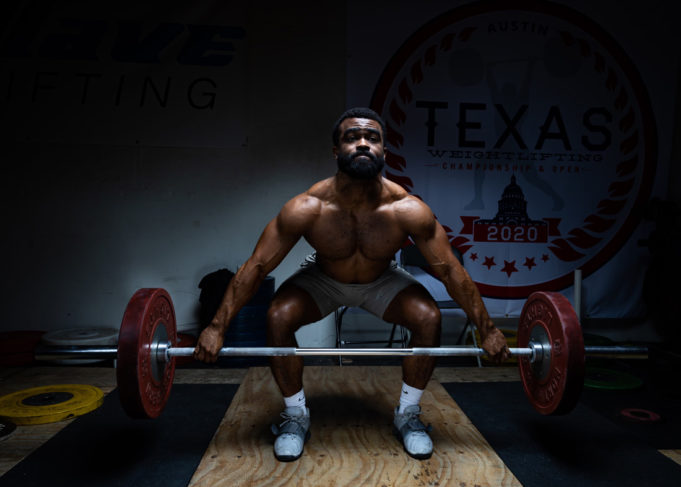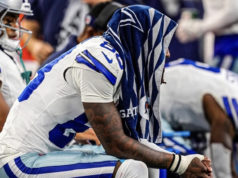Our society, especially this time of year, spends a boatload of energy focusing on team sports. Our city devotes almost equal intensity to TCU teams and their athletes. Though many Fort Worthians have become acquainted with Brandon Victorian, it’s probably through his magnetic personality rather than his athletic accomplishments — until now.
Weightlifting is a term most used by exercisers going to their local gym to throw some iron on a curl bar and start grinding away while staring uncomfortably back into their own eyes in a floor-to-ceiling mirror. Add in some texting combined with flexing, and someone just completed a session of weightlifting. But weightlifting as a sport — or Olympic weightlifting as it’s commonly designated — is a breeding ground for some of the most explosive athletes in the world. These lifters don’t care about biceps. Instead, they’re focused on accumulating the heaviest possible total between two lifts: the snatch and the clean and jerk. For the uninitiated, a snatch is lifting a barbell from the floor to overhead in one synchronous motion. The clean and jerk is similar, but the bar is first lifted from the ground to the shoulders in one motion (clean) and then jumped and pressed from the shoulders to overhead (jerk) afterwards. This type of lifting is featured in the Olympic games and isn’t something that Team USA has thrived in much this century, though many are working diligently to change that, including — possibly — Victorian.
In American sports culture, the Olympic lifts are generally something that’s done to increase power output in preparation for other sports. Most high school football players train the power clean, which simply means they’ll lift the weight from the floor to their shoulder without dropping into an ass-to-ankles squat like a weightlifter will when receiving the bar. That was Victorian’s experience as he had performed the clean only while training for football in high school. Originally hailing from Monroe, Louisiana, the Horned Frog alum didn’t have aspirations of attending TCU until it was suggested as a possible destination by a family friend’s daughter who invited him to join them for a campus visit. Resigned that staying local and attending Louisiana Tech was probably his best option, the three-sport varsity athlete — who didn’t have college athletics aspirations — thought staying close to home would be a good way to keep up with friends and keep college affordable. His visit to our city changed his mind, somewhat, but the undeniable expense of our purple and white private institution still made the decision unrealistic for the pragmatic Victorian, who intended to study engineering.
His destination, and consequently his life, changed at the hands of a TCU admissions counselor who suggested he apply for the Gates Millennium Scholarship — an initiative funded by the Bill and Melinda Gates foundation to provide tuition and expenses for outstanding minority students — just to see what would happen. When confirmation of the prestigious scholarship arrived in Victorian’s mailbox, he was still planning to stay local and become a Bulldog — before he was reality-checked by his mother, who wanted to see him move away and take advantage of the tremendous opportunity for a TCU degree without going into debt.
“She kind of gave me this death glare,” Victorian recalled.
The decision was solidified when the TCU admissions counselor he’d met called him to check in after he was awarded the scholarship. The boot-state transfer quickly settled into campus life and became a well-known facilitator for Frog Camp, the new-student introduction program, and eventually a director of the program during his senior year. Victorian became so popular on campus that he was nominated for the designation of Mr. TCU during homecoming week of his senior year in 2018 and voted the winner. During his undergraduate, he worked out at the campus recreation center to maintain his fitness in addition to playing intramural sports with friends from the engineering program, but it was during his final year that he became interested in the sport of CrossFit after watching a documentary on Netflix.
CrossFit, an evermore prevalent exercise racing sport, incorporates the Olympic lifts of weightlifting into many of their workouts. Victorian was dabbling in the lifts — admittedly learning the form mostly from YouTube videos and recounting high school techniques — and attending CrossFit workouts at various local gyms. One Saturday, he agreed to meet someone for a CrossFit workout, which his partner never showed up for, but afterwards he met a group of people who were seemingly off in the corner doing their own thing: It was the Blue Wave barbell club. Originally housed in a partnership with another gym, Blue Wave Weightlifting now stands independently in a facility northwest of the Camp Bowie traffic circle. The group encouraged Victorian to start training with them, and his numbers — which were already impressive for a beginner — started to climb as his form was refined by the coach and owner, Chris Lofland. Then working for Recaro Aircraft Seating using his electrical engineering degree, Victorian was enjoying the dedicated regime in his new sport when COVID-19 forced all of his training to become remote. Undeterred, a friend with the requisite equipment cleared the way for the aspiring lifter to drill his technique in a garage until closure mandates were lifted.
In October 2020, Victorian competed at his first meet in Dallas. His performance qualified him for the state competition and eventually nationals, where the newcomer had the third heaviest snatch in his weight category and finished fifth overall. His first competition season proved impressive enough for Victorian to start making bids to travel to international competitions with the USA Weightlifting team (USAW), the first of which was the XL International Tournament, “Manuel Suárez in Memoriam,” in Cárdenas, Cuba, which he had just returned from when we spoke. Competing in the 81kg (178.2lb) weight class, he was able to snatch 138kg (303.6lb) before cleaning and jerking 173kg (380.6lb), the latter of which was a personal best. Mr. TCU’s individual lifts were each fourth best in his weight class, respectively, but his combined total of 311kg (684.2lb) meant he returned with a bronze medal.
When asked about his trip, two things stood out: heat and money. It was surprising to hear a native Louisianan and now Texan be overwhelmed by the temperature. Victorian said the lifting venue had no air conditioning and that our harsher than typical winters had not prepared him for the profuse sweating.
“You were sweating a lot,” said one of his USAW teammates in a half-joking manner as they returned to their hotel. “We were concerned for your health.”
Money — or, more specifically, currency — was also a laughing point from the bronze medalist who was told to be prepared with dollars, euros, and pesos depending on what you were trying to buy and where. “One place we bought espresso from the previous day just stopped taking any money at all, so we had to charge it to our hotel.”
After considerable success following a relatively short time training in his sport, naturally I inquired if the Olympics were a possible goal for the 25-year-old engineer. Weightlifting, like many sports, designates its athletes by weight class. Victorian is naturally in the 89kg (195.8lb) class, and an athlete must weigh in below that designation to compete. He worked to get to and now competes in the 81kg class. The Olympic committee generally designates seven classes with names akin to boxing (featherweight, bantamweight, heavyweight, and so on), and the weight ranges for those classes change over time. During the Tokyo Games, Victorian would have been considered a middleweight 73-81kg. The Paris Games in 2024 will consolidate weight classes into only five categories, effectively bumping him into an 89kg class along with correspondingly stronger athletes.
Undeterred, Victorian is just enjoying his progression and is planning his training around the American national championships and American open meets through USAW to see where he might fit at the next level. While still somewhat niche, the sport of weightlifting is expanding all the time, and we have a local lifter who’s likely to be wearing a USA patch on his lifting singlet and representing USAW for many years to come.












